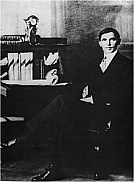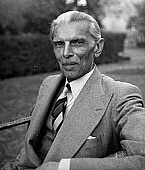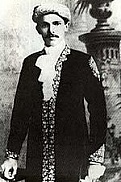
This photo shows M.A Jinnah, as a young lawyer.
In 1906, Jinnah joined the Indian National Congress, which was the largest Indian political organization. Like most of the Congress at the time, Jinnah did not favour outright independence, considering British influences on education, law, culture and industry as beneficial to India. Jinnah became a member on the 60-member Imperial Legislative Council. The council had no real power, and included a large number of un-elected pro-Raj loyalists and Europeans. Nevertheless, Jinnah was instrumental in the passing of the Child Marriages Restraint Act, the legitimization of the Muslim waqf (religious endowments) and was appointed to the Sandhurst committee, which helped establish the Indian Military Academy in Dehra Dun. During World War I, Jinnah joined other Indian moderates in supporting the British war effort, hoping that Indians would be rewarded with political freedoms.
Jinnah had initially avoided joining the All India Muslim League, founded in 1906, regarding it as too Muslim oriented. However, he decided to provide leadership to the Muslim minority. Eventually, he joined the League in 1913 and became the president at the 1916 session in Lucknow. Jinnah was the architect of the 1916 Lucknow Pact between the Congress and the League, bringing them together on most issues regarding self-government and presenting a united front to the British. Jinnah also played an important role in the founding of the All India Home Rule League in 1916. Along with political leaders Annie Besant and Tilak, Jinnah demanded "home rule" for India"”the status of a self-governing dominion in the Empire similar to Canada, New Zealand and Australia. He headed the League's Bombay Presidency chapter.
In 1918, Jinnah married his second wife Rattanbai Petit ("Ruttie"), 24 years his junior. She was the fashionable young daughter of his personal friend Sir Dinshaw Petit, of an elite Parsi family of Bombay. Unexpectedly, there was great opposition to the marriage from Rattanbai's family and the Parsi community, as well as orthodox Muslim leaders. Rattanbai defied her family and nominally converted to Islam, adopting (though never using) the name Maryam Jinnah, resulting in a permanent estrangement from her family and Parsi society. The couple resided in Bombay, and frequently travelled across India and Europe. In 1919 she bore Jinnah his only child, daughter Dina Jinnah.
In 1924, Jinnah reorganized the Muslim League, of which he had been president since 1916, and devoted the next seven years attempting to bring about unity among the disparate ranks of Muslims and to develop a rational formula to effect a Hindu-Muslim settlement, which he considered the pre condition for Indian freedom. He attended several unity conferences, wrote the Delhi Muslim Proposals in 1927, pleaded for the incorporation of the basic Muslim demands in the Nehru report, and formulated the "Fourteen Points".



